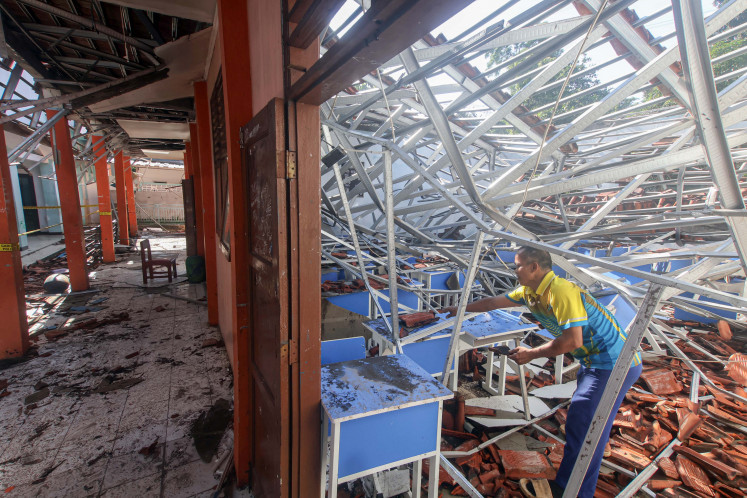Popular Reads
Top Results
Can't find what you're looking for?
View all search resultsPopular Reads
Top Results
Can't find what you're looking for?
View all search resultsE-commerce has evolved: Lazada CEO
Therefore, we believe the Indonesian e-commerce industry will keep growing significantly as the role of e-commerce platforms continues to evolve. People are getting more and more engaged with e-commerce and it will become a new digital lifestyle in the near future.
Change text size
Gift Premium Articles
to Anyone
T
he pandemic has provided a hotbed for the growth of e-commerce in Indonesia. Management consulting company Redseer noted that the number of online shoppers grew to 85 million during the pandemic from 75 million pre-COVID-19.
The country’s e-commerce gross merchandise value (GMV) is also expected to be the third-highest in the world this year at US$40 billion, surpassing India’s forecast of $38 billion, the Redseer report reads.
On similar vein, the e-Conomy SEA 2020 report by Google, Singapore state investor Temasek Holdings and business consultancy Bain & Co. also noted that e-commerce remained the main growth driver in Indonesia’s digital economy this year, whose GMV is projected to grow by 11 percent year-on-year this year to $44 billion.
The Jakarta Post’s Eisya A. Eloksari interviewed e-commerce platform Lazada Group and Lazada Indonesia CEO Chun Li via e-mail on Nov. 16 to discuss the company’s business amid the pandemic and its plan for the future.
Question: How has the pandemic affected Lazada’s business?
Answer: The pandemic has impacted how businesses operate, but it also offers new opportunities through digital transformation as foot traffic to retail stores may take some time to resume to pre-COVID-19 levels.
E-commerce has proven to be a lifeline for businesses amid the pandemic, and it needs to be a more concerted part of our business strategy going forward. This will not only bolster returns and provide new ways for sellers to engage with consumers, but also ensure they are better prepared for any future disruptions. This is what we at Lazada have been doing, to help consumers and brands reshape their mindset to adapt and survive in this challenging situation.
We have been seeing uptrends in 2020. In Lazada Indonesia, we recorded over a 100 percent growth for daily average orders year-on-year for the quarter ended on 30 June 2020, and we believe we will continue to grow further.
What is the company’s strategy this year, and the next few years?
This year, we continue our efforts to grow sustainably by focusing on our key strengths which are e-commerce, technology and logistics. We also continue to empower local businesses and digital transformation.
Some of the things we are conducting are regular customer-focused research to ensure that our innovations and initiatives are in line with our customers’ needs and innovating our advanced technology and our end-to-end logistics solutions.
We believe that by focusing on our key strength, we will eventually be able to reach our goal to be the leading e-commerce platform in Indonesia that stays in the country for a very long time.
How does Lazada plan on helping small and medium enterprises (SMEs) to digitalize?
We partnered with the government in Kakak Asuh UMKM (SMEs Foster Siblings) - a mentoring program to help SMEs go digital. Our team also routinely visits and invites offline merchants to get on board our platform.
We also do regular webinars with various ministries and associations to empower local businesses. In September, we had 12,000 sellers attending our Level Up Seller Conference and thousands of our sellers are also engaged in our monthly webinar and community discussions.
We have a New City strategy which is our initiative to grow new buyers and incubate sellers, helping develop the e-commerce ecosystem outside of Greater Jakarta such as in Bandung [West Java], Medan [North Sumatra], and Semarang [Central Java]. We are looking to better match buyers and sellers within those cities.
This strategy has led to our seller base growing twice as fast in our targeted growth areas, compared with the overall seller base. The buyer growth rate in those cities is 2.5 times higher than that of Greater Jakarta.
We believe the network of e-commerce must work hand-in-hand to empower SMEs to survive and to grow. In the end, this is expected to help the country’s economic recovery.
How do you plan to leverage Alibaba's technological innovations into Lazada's platform?
We have a dedicated team of AI [artificial intelligence] experts in Lazada who are focusing on improving customers’ experience. Lazada also implements AI through chatbots for sellers and customers, which are called CLEO and ADA, respectively.
Through CLEO, we can operate more efficiently and have a higher resolution rate than the industry’s average. Meanwhile, with ADA, sellers can quickly obtain information which will be crucial to their day to day operations.
One of our strengths is big data technology which enables us to know what product is trending in a certain area at a given time. This trend is then automatically shown to our sellers in the area so they can adjust their strategy accordingly.
Many e-commerce platforms are tapping into payment services and even e-wallets. Does Lazada have a plan to expand its business in the financial service sector?
We believe every e-commerce has its own strategy to win the hearts of the customers and we see that as a good sign that every industry player continues to move aggressively and the ecosystem remains growing.
Lazada has itself pioneered cash-on-delivery to accommodate 70 percent of Southeast Asia’s people who are still unbanked, but we will always be innovating to ensure the best experience for our sellers and consumers.
In terms of financial services, Indonesian customers can pay utilities like internet, cable TV and electricity as well as alms through Lazada under the Digital Goods channel.
How do you envision the Indonesian e-commerce market in the future?
COVID-19 is accelerating digital transformation. Both brands and consumer mindsets have been reshaped due to the pandemic and they have been moving online to meet consumers’ needs as well as to stay relevant and competitive.
According to a [market research firm] Kantar study in 2020, there is a shift in consumer online shopping behavior in this new normal. More shoppers, especially urban millennials, are assessing digital media more often. Meanwhile, e-commerce has also evolved into more than just a transaction platform, but also an experience platform.
Therefore, we believe the Indonesian e-commerce industry will keep growing significantly as the role of e-commerce platforms continues to evolve. People are getting more and more engaged with e-commerce and it will become a new digital lifestyle in the near future.










